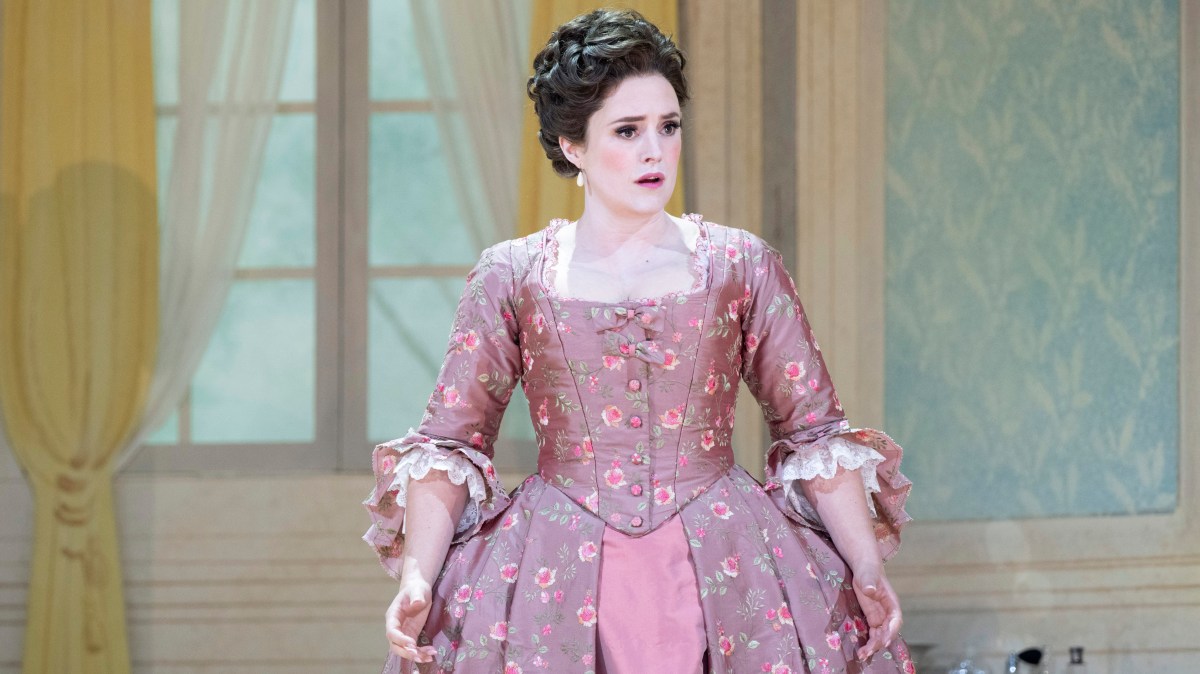When the soprano Louise Alder walks onto the stage at the Royal Albert Hall for the Last Night of the Proms, she will bring along one very small guest.
Alder, 38, is pregnant with her second baby, due in February. After the trials of the first three months, she said being pregnant had helped, rather than hindered, her singing voice as “it finds new colours and feels very grounded”.
She said: “By the time the pregnancy has settled into the second trimester, good things are starting to happen and the hormones have slightly levelled out and the growth aids and strengthens the body as the baby strengthens and grows.”
Alder said her first pregnancy with her daughter, Lea, now two, had a similarly positive effect, until the final two weeks when she “really couldn’t breathe any more”.
She added: “The physical side for me — well, in a useful way to professional classical singing — I loved. It helped, it bolstered me singing-wise. “Your body always reacts positively when your brain is in a good mental space and those things are so intricately linked as a singer.”
A scientific study in The Journal of Voice in 2012 found “perceptible changes in vocal brightness during pregnancy” that were consistent with the known effects of raised hormone levels.
After more than 80 concerts in eight weeks, the final BBC Prom begins at 7pm on Saturday. Other soloists include the trumpeter Alison Balsom, in her last performance before retiring, and the comedian Bill Bailey, making his Proms debut playing the typewriter.

In the Royal College of Music gala at Buckingham Palace in 2017
SHUTTERSTOCK
Alder said she was nervous about her performance at the set-piece finale, in which she will sing two operatic arias in the first half, followed in the second half by an orchestral arrangement of Bohemian Rhapsody, accompanied by Brian May and Roger Taylor of Queen, a medley from the musical My Fair Lady and, finally, Rule, Britannia!.
She said: “The adrenaline rise can be so sharp when you’re about to go on stage — or if something goes wrong on stage and then you’re having to deal with that at the same time as being aware that you’re being watched by thousands of people. In this case, millions.
“I think, generally, I just try to remember that it’s not rocket science or brain surgery that we’re doing and that people are there to enjoy the experience and that you bring, I hope, joy to them by performing, and through storytelling you are helping relieve some of the everyday anxieties and stress that they have.”
While her pregnancy brings joy, life as a freelance singer adds some stress. She said: “I couldn’t tell companies and concert promoters that I was backing out of projects too early in case something happened to the pregnancy. Your entire financial wellbeing hangs on being able to do the concerts and being able to be well for those concerts. And that was quite terrifying and it was again this time.”
Over the summer, she has been performing in The Marriage of Figaro at Glyndebourne three times a week and has concerts scheduled until February 9 when she will be performing Mozart’s Cosi fan tutte in Monte Carlo.

As Countess Almaviva, with Pippa Barton and Johanna Wallroth, at the Glyndebourne festival this summer
RICHARD HUBERT SMITH
Alder, who is married to Mark Alder Bennett, a French horn player, said: “We decided that we wanted children and that we would make it work. I know the idea seems crazy to most people, if you come from a very structured nine-to-five mentality. Touring all around the world, not ever knowing week to week quite how the rehearsal schedule will be.
“But we make it work and [Lea] toured with me for the first year when I breastfed and I think that not many new mothers can say that they had their child with them while they were working.”
Alder credits her musician parents, rather than her Church of England all-girls state comprehensive school in Fulham, west London, for getting her into music. She began learning the violin as a child before discovering her voice when she was studying music at the University of Edinburgh. She graduated with a first, and went on to study at the Royal College of Music.
• BBC Proms 2025 reviews: our music critics’ verdicts on the concerts
She said: “The majority of the people that I studied with at music college went to private school because the provision for music in private schools is wonderful and the facilities are better.
“You know, everything is easier with an injection of money into things like concert recital halls or practice rooms or even just instruments. We didn’t have that at Lady Margaret. My school experience was that they were very keen on music, but that the provision for it was not fantastic.”

With the Monteverdi Choir and Orchestra in Handel’s Semele at the Alexandra Palace Theatre in 2019
THOMAS BOWLES/ALAMY
Less than 5 per cent of undergraduates at Britain’s leading conservatoire, the Royal Academy of Music, came from what it described as a working-class background, according to figures from the Independent Society of Music released last year. There is no obligation for state primary schools to hire a specialist music teacher, and many do not.
In Saturday’s show, Alder is especially excited to play Eliza Doolittle, the Cockney flower seller from My Fair Lady.
Alder, who grew up in Wimbledon, said: “I think that there isn’t a more perfect character for me, who grew up as a southwest Londoner, with the posher side and the less posh side. I love portraying both sides of Eliza Doolittle. I think that they make her and they make me too, so I love that.”

